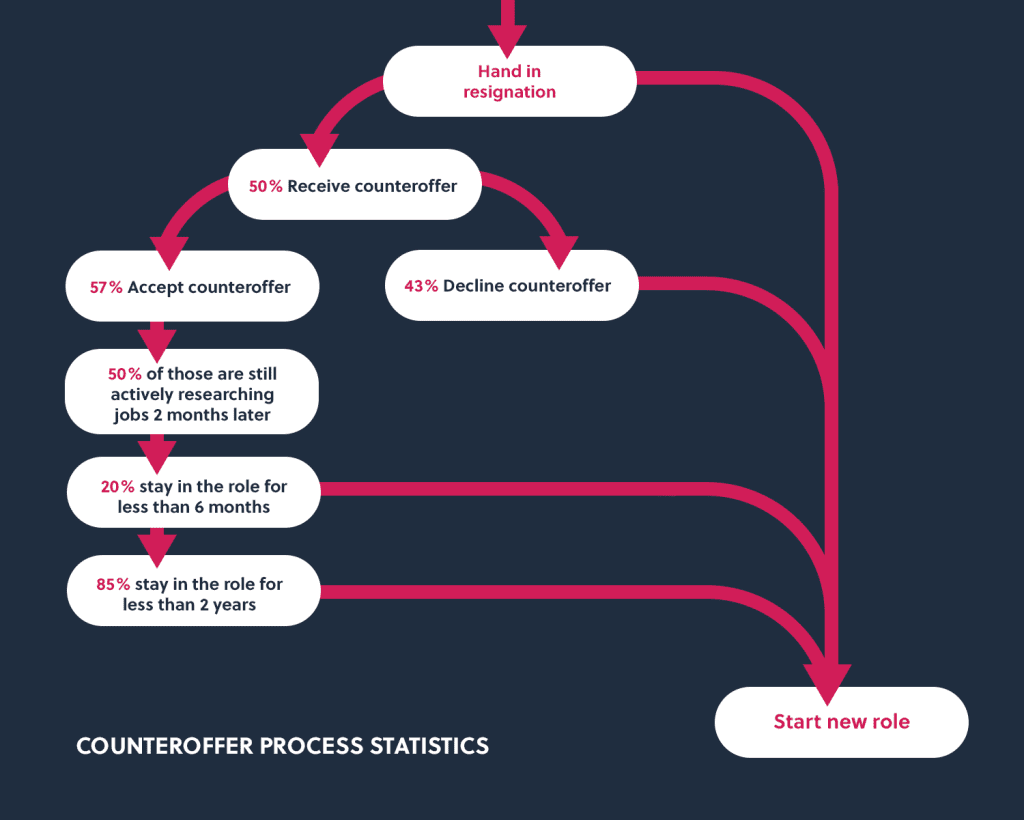Whilst preparing for an interview is usually the most crucial part of the process when searching for a new role, another important part of the pre-interview process is considering how you will handle handing in your notice, and what your response would be should you be counteroffered by your current employer.
Why do businesses counteroffer?
Counteroffering is becoming an increasingly common practice for the majority of businesses, most of which are keen to retain their existing employees in a highly competitive hiring market. Finding a replacement for an employee that has chosen to leave has always been a challenge and involves finding and embedding someone with the correct skillset into the business, which has always been a lengthy process. But, in the current market, this has become even more challenging, with a demand for talent and skills that, more often than not, is outstripping supply.
Equally, replacing existing staff is always more expensive overall than simply offering a counteroffer to retain someone who is already employed. The process to hire and train up is a lengthy one, and will mean significant downtime and usually a loss of productivity and profit as a result. Losing a key team member could also mean a drop in the company morale, and could even create a domino effect for both the business image and team motivation.
What are the risks of accepting one?
While being offered more money is obviously very attractive in the short term, for the majority of individuals looking for a change of roles, money is not the sole motivator to do so; otherwise, it would simply be a case of negotiating salaries with the existing employer. In the case of the latter, if you have already requested a pay rise from your employer, why has it only then been offered once you have already decided to leave? If money is your sole motivator, and this is all you would require to stay, then it’s important to have these conversations with your existing employer before even going to interview. Given that many industries are close-knit in terms of opportunities, it’s essential to preserve your reputation: you don’t want to be known as someone who will interview but then accept a counteroffer.
It is also important to consider whether your employer truly values the skillset and experience that you bring to the business, or whether they are simply scrambling to keep you in situ whilst they look to hire a long-term replacement. Acceptance of a counteroffer is likely to create an awkward atmosphere, whereby the trust in the loyalty of both parties to one another is irreparably damaged. In short, you are unlikely to progress and strengthen your career in a business that you were once willing to leave, and both you and your employer will be aware of this.
The fact of the matter is, over 80% of individuals who do choose to accept a counteroffer will then end up leaving that same company within the next 6 months. More money might tempt you to stay, but it’s a temporary fix: the same gripes that caused you to begin your search in the first place are there to stay too.
Handing in your notice
Ensure you hand in your notice in a professional manner and retain a tone of appreciation and gratitude throughout whatever the circumstances of your resignation, it is important to ensure that you state that you have enjoyed working with the company, but your decision is final, and you will work to ensure that your handover is as smooth and seamless as possible. After all, you will need to obtain references from your company in the future, and leaving on the best terms possible is the ideal outcome. For more information on what to include in your resignation letter, click here.

References: 1. Zippia, 2. Provide People, 3. Recruiting Daily, 4. Reed Global, 5. The Undercover Recruiter, 6. HVH Consulting, 7. AIER. 8. Robert Half, 9. Forbes, 10. All Business